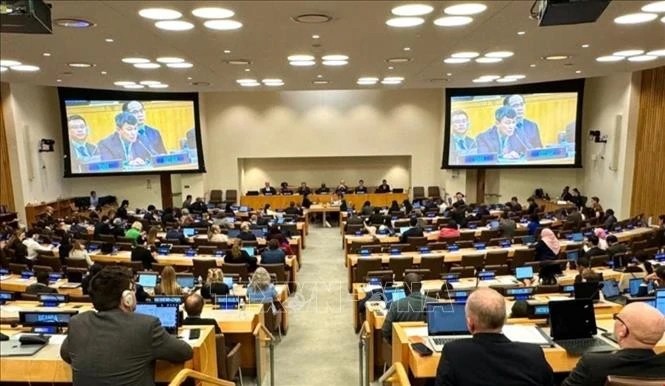UNCLOS: Timeless Framework for Ocean Governance
| International Scientific Conference on the South China Sea Opens in Quang Ninh | |
| Political Will: Crucial for a South China Sea Code of Conduct |
Could you share with us the value and role of the United Nations Convention on the Law of the Sea?
As a comprehensive legal document consisting of 320 articles, divided into 17 parts and 9 annexes, the United Nations Convention on the Law of the Sea (UNCLOS), often referred to as the "Constitution of the Oceans," establishes a comprehensive legal framework regulating all activities on the seas and oceans, which cover more than 70% of the Earth's surface. The Convention also serves as the foundation for nations to cooperate in the orderly and sustainable governance of the oceans. Some of the key points and significant meanings of the Convention are as follows.
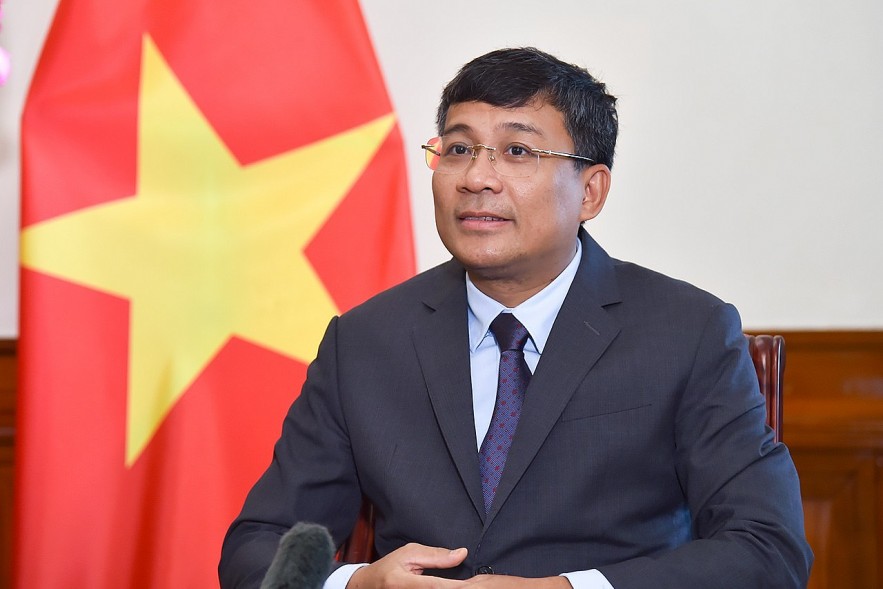 |
| Permanent Deputy Minister of Foreign Affairs, Nguyen Minh Vu |
First, UNCLOS comprehensively and thoroughly addresses the issues of the scope and status of maritime zones, providing a basis for countries to exercise their rights and conduct activities at sea. The provisions regarding maritime zones in the Convention balance the interests of different groups of countries, including coastal states, landlocked countries, and those with unfavorable geographic conditions.
The Convention also includes many provisions on the protection of the marine environment and marine scientific research—subjects entirely new compared to previous UN maritime treaties (the 1958 Geneva Conventions on the Law of the Sea). UNCLOS establishes an important legal framework for managing marine resources and conserving and sustainably using these resources for future generations. The subject of marine scientific research is also regulated in a way that balances the sovereignty and jurisdiction of coastal states with the need for cooperation and increased understanding for better ocean governance.
Finally, the Convention sets out a relatively comprehensive dispute resolution system, reaffirming the obligation to peacefully resolve international disputes under the UN Charter, while specifying peaceful measures such as mediation, arbitration, or judicial settlement. Through this system, disputes related to the interpretation and application of the Convention can be resolved promptly, helping to maintain peace, stability, and prevent conflicts. Moreover, rulings by tribunals established under UNCLOS contribute to clarifying the provisions of the Convention, ensuring its integrity and effective implementation.
UNCLOS can be considered one of the greatest achievements of international law in the 20th century. The Convention not only codifies customary international law but also advances the development of international maritime law to meet the new trends in the use and exploitation of the seas and oceans.
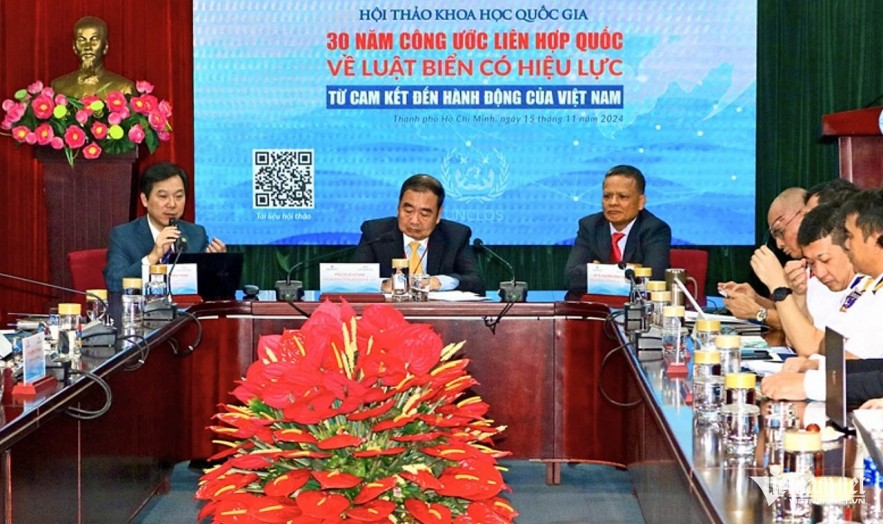 |
| Conference “30 years of the United Nations Convention on the Law of the Sea coming into force: From Vietnam's commitment to action” held in Ho Chi Minh City. |
What contributions has Vietnam made to the development and implementation of the Convention 30 years after its entry into force?
Vietnam has always actively and responsibly participated in the signing and implementation of the Convention. Right after the document was adopted and opened for signature, Vietnam was one of the first 107 countries to sign the Convention in Montego Bay (Jamaica) and ratified it before it entered into force. Over the years, to implement UNCLOS, Vietnam has gradually improved its legal system regarding the seas and oceans, issuing legal documents, strategies, policies, and plans to ensure the effective and sustainable use and exploitation of the seas.
As a responsible member of the international community, Vietnam has also considered the Convention as an important foundation for carrying out maritime cooperation activities. Vietnam has made significant achievements in resolving maritime delimitation issues with neighboring countries. Notably, in 1997, Vietnam, together with Thailand, resolved the maritime delimitation issue in the Gulf of Thailand, marking the first maritime delimitation agreement within ASEAN after the Convention entered into force. Vietnam was also the first and only country to date to sign a maritime delimitation agreement with China—the Gulf of Tonkin Agreement in 2000. Along with Indonesia, it resolved the continental shelf delimitation issue and later the exclusive economic zone delimitation in 2003 and 2022, further enriching the practice of maritime delimitation in accordance with the Convention.
In addition, Vietnam has actively participated in various activities within the framework of international mechanisms established under the Convention, putting forward numerous initiatives recognized by the international community, gradually enhancing Vietnam's role on the global stage.
It can be seen that, in contributing to the formation and development of UNCLOS, Vietnam has consistently demonstrated its role as an active and responsible member of the Convention, always upholding the value, respecting, and fully implementing the Convention, while also asserting Vietnam's position, role, and proactive stance on the international stage.
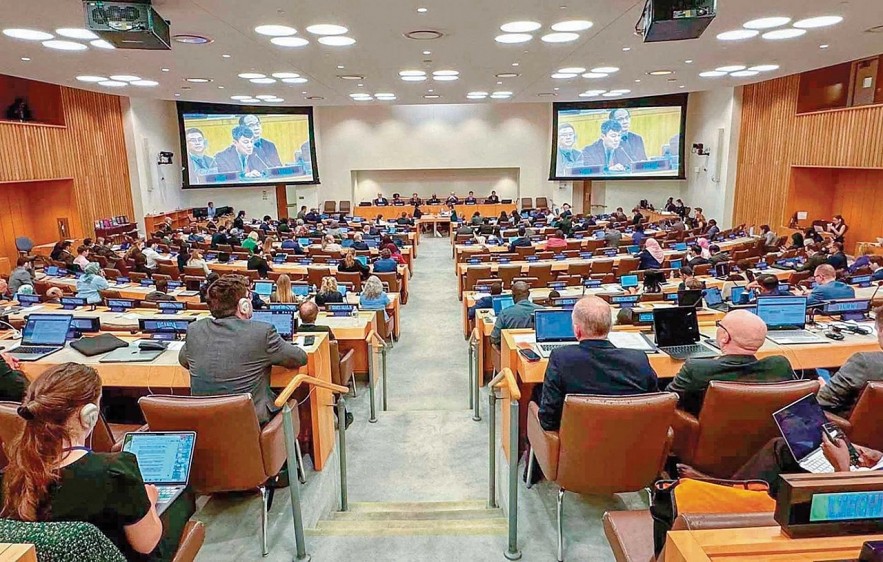 |
| Deputy Minister of Foreign Affairs Nguyen Minh Vu speaks at the 34th Conference of States Parties to the United Nations Convention on the Law of the Sea at the United Nations headquarters in New York from June 10-14. |
What contributions will Vietnam make in the future to promote and implement this Convention?
In the future, Vietnam will strive to successfully implement tasks that continue to demonstrate its commitment to respecting, adhering to, and fully implementing UNCLOS, and embody Vietnam's image in the new era of national development as a trusted friend and a responsible member of the international community.
First, Vietnam will continue to issue policies and improve the national legal system concerning seas and islands towards sustainable development, ensuring the protection of maritime sovereignty, and aligning with international law, including UNCLOS.
Second, Vietnam will always uphold the rule of law and consider the Convention as the legal basis for conducting maritime activities, including peacefully resolving maritime disputes with neighboring countries, aiming for peaceful and sustainable governance of maritime areas, including the South China Sea.
Third, Vietnam will participate and make substantial contributions to forums on maritime law and ocean governance, such as the UNCLOS States Parties Conference, the United Nations Oceans Conference, and continue to contribute to issues of international concern, including climate change, and the conservation and sustainable use of marine resources and biodiversity.
 |
| Vietnamese and international speakers discuss value of UNCLOS during a seminar. |
Fourth, Vietnam will call on countries to continue ratifying and joining the Convention, while promoting the sincere and full implementation of its provisions, so that UNCLOS can further enhance its role as the comprehensive legal framework regulating all activities on the seas and oceans.
Finally, Vietnam will continue to strengthen cooperation with international legal agencies, particularly specialized bodies on oceans and maritime law, in a deeper and more substantial manner.
 | UN Agreement on Biodiversity Beyond National Jurisdiction: New Milestone of International Law The agreement on the Biodiversity Beyond National Jurisdiction (BBNJ) is the third implementing agreement of UNCLOS, further strengthening UNCLOS and contributing to the consolidation of ... |
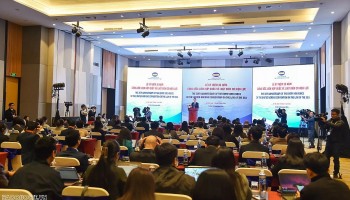 | Vietnam Celebrates 30th Anniversary of UNCLOS The Foreign Ministry held a ceremony to celebrate the 30th anniversary of the entry into force of the UNCLOS to review the value and role ... |
Recommended
 Seas and islands
Seas and islands
Vietnam Endorses Common Voice on Ocean Jurisdiction
 Seas and islands
Seas and islands
Dialogue as Key to Settling Disputes and Advancing Law of the Sea
 Seas and islands
Seas and islands
RoK Navy Ship Pays Friendly Visit to Da Nang City
 Seas and islands
Seas and islands
Naval Region 5 Promotes Reading Culture, Fosters Patriotism
 Seas and islands
Seas and islands
Coast Guard Region 2 Command Hosts Philippine Coast Counterpart
 Seas and islands
Seas and islands
Vietnam - Thailand Navy: Coordination to Well Address Problems at Sea
 Seas and islands
Seas and islands
Honoring the Fallen: Incense Offering for the 37th Anniversary of Gac Ma
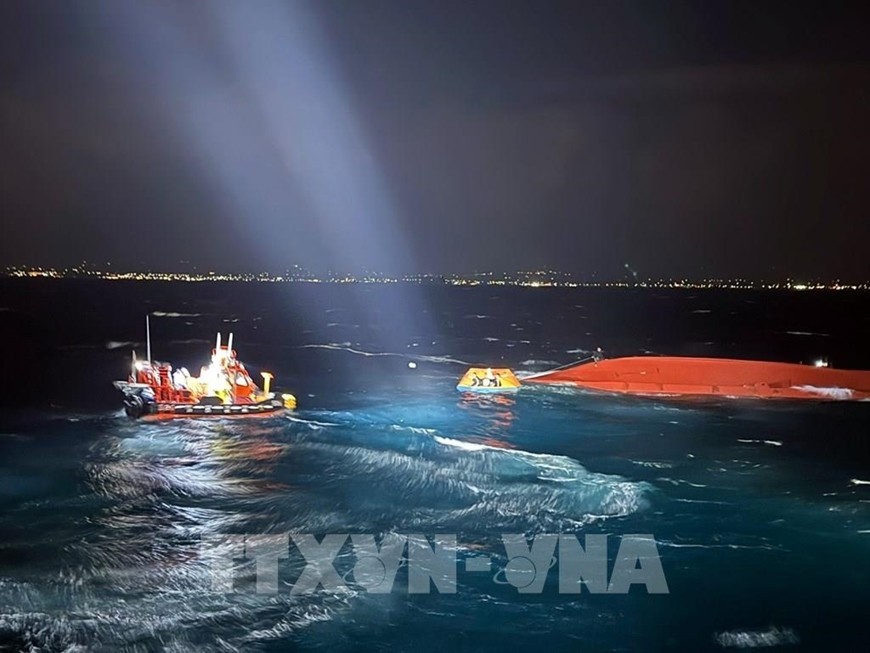 Seas and islands
Seas and islands


